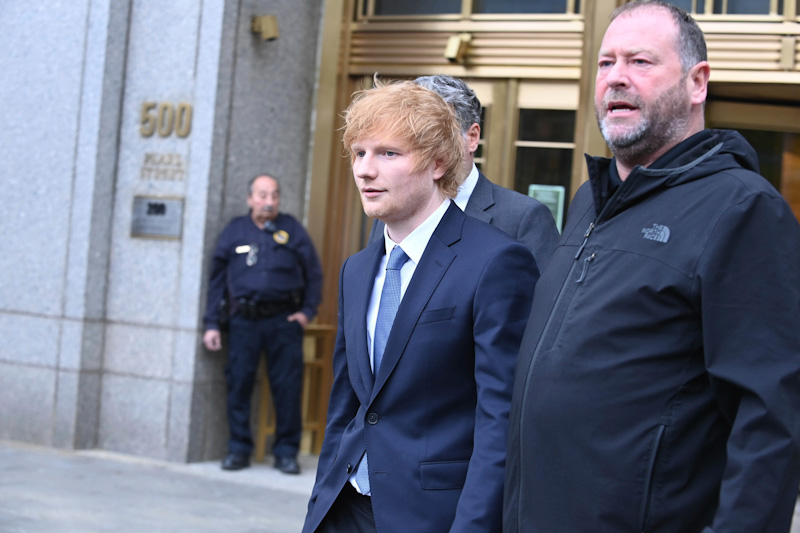Copyright case against Ed Sheeran based on 'an extremely common chord progression,' law prof says

Singer Ed Sheeran leaves court in New York City on April 25. Photo by Andrea Renault/Star Max/IPx via the Associated Press.
Civil rights lawyer Benjamin L. Crump told jurors in Manhattan, New York City, in opening statements Tuesday that he has “a smoking gun” showing that singer Ed Sheeran copied the Marvin Gaye song “Let’s Get It On” when he wrote “Thinking Out Loud.”
The smoking gun, Crump said, is a recording of a concert in which Sheeran interspersed Gaye’s song with his, according to coverage by the Associated Press, the New York Times and CNN.
Crump represents heirs of Gaye’s co-writer Ed Townsend. A lawyer for Sheeran, Ilene S. Farkas, said there was no copying, and the chord progression that Sheeran and his co-writer used is extremely common.
“Plaintiffs do not own them because nobody does,” Farkas said.
A verdict for the plaintiffs, Farkas said, would change what songwriters are able to compose.
Jennifer Jenkins, a professor at the Duke University School of Law, made a similar point in an interview with the New York Times.
“If in this case an extremely common chord progression, set to a basic harmonic rhythm, is privatized,” Jenkins said, “then we are going in reverse, and we are removing essential ingredients from every songwriter’s toolkit.”
The chords are at the center of the dispute because “a quirk of the law” protects only the sheet music for many songs written before 1978, the New York Times explains. The “skeletal” sheet music contained only chords, lyrics and a melody, according to the New York Times.
A copyright fight over another Marvin Gaye song, “Got to Give It Up,” led to a $7.4 million verdict in a suit claiming infringement by the “Blurred Lines” song by Pharrell Williams and Robin Thicke.
Commentators feared that the March 2015 verdict could redefine the law of copyright infringement. A federal appeals court upheld the verdict, the New York Times reported in 2018.
According to the New York Times, the “Blurred Lines” case “shocked many legal experts—and musicians—who believed that Mr. Thicke and Mr. Williams were being penalized for using basic musical building blocks, like harmonies and rhythmic patterns, that had long been considered part of the public domain.”
But Led Zeppelin prevailed in a 2016 trial that accused the group of copying the beginning guitar riff in “Stairway to Heaven.” An appeals court upheld the verdict in 2020, which “seemed to steer case law back to more familiar territory,” according to the New York Times.
See also:
ABA Journal: “Lawyers, songs and money: Music that changed the law”
Write a letter to the editor, share a story tip or update, or report an error.



